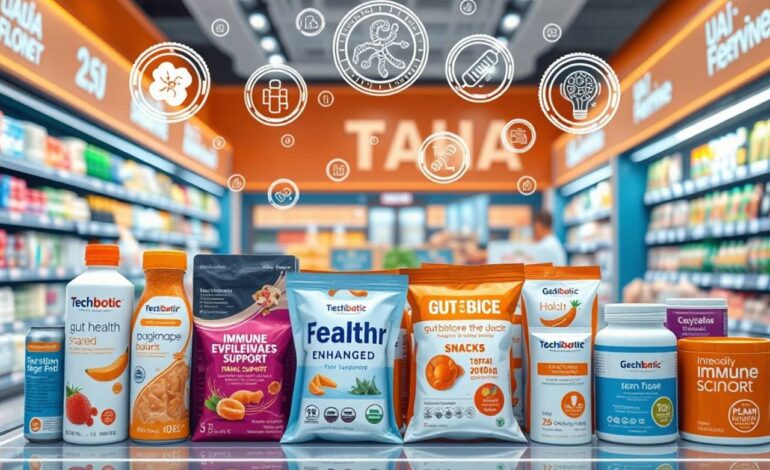Postbiotics in Packaged Foods: The Next Phase After Probiotics and Prebiotics
Gut Health Meets GCC Innovation
As the UAE accelerates nutrition-driven innovation and aligns with its National Food Security Strategy, one trend is quietly redefining the functional foods market — postbiotics.
For years, probiotics and prebiotics have dominated gut health conversations. But now, postbiotics — non-living yet biologically active compounds — are emerging as powerful additions to packaged foods, beverages, and supplements. Unlike live probiotics, they don’t require refrigeration, making them a perfect fit for the UAE’s hot climate and complex import/export supply chains.
For food businesses, this represents a new growth frontier. And with regulatory complexity, consumer education, and product stability at stake, Tech4Serve’s Food Business Consultants help UAE brands bring postbiotic innovations to market with confidence.
What Are Postbiotics?
Postbiotics are non-viable bacterial products or metabolites created when probiotics ferment fibers or substrates. Although the live microbes may be deactivated (often by heat), their beneficial compounds remain intact and effective.
Common postbiotic components include:
- Short-chain fatty acids (SCFAs): butyrate, acetate — essential for gut and metabolic health
- Cell wall fragments: peptidoglycans, lipoteichoic acids — linked to immune response
- Polysaccharides, enzymes, and peptides
- Anti-inflammatory and antioxidant metabolites
Because they are heat-stable and shelf-friendly, postbiotics overcome cold-chain challenges — a significant advantage in UAE’s food logistics and exports.
Tech4Serve’s Food Factory Consultants guide brands in identifying the right postbiotic ingredients, ensuring compliance with ESMA regulations, and designing consumer-ready formulations.
Prebiotics, Probiotics, and Postbiotics — What’s the Difference?
| Type | What They Are | Role in Gut Health | Stability | Food Use Cases |
|---|---|---|---|---|
| Prebiotics | Indigestible fibers (e.g., inulin) | Feed beneficial bacteria | High | Cereals, snacks, fortified drinks |
| Probiotics | Live microbes (e.g., Lactobacillus) | Repopulate gut flora | Low | Yogurts, kombucha, fermented foods |
| Postbiotics | Non-living bacterial metabolites | Support immunity, gut, metabolism | Very High | Baked goods, beverages, supplements |
👉 For UAE food manufacturers, postbiotics solve stability and cost challenges. With no need for refrigeration, they fit perfectly into ambient products, e-commerce, and exports.
Tech4Serve’s Food Processing Consultants assist brands in evaluating whether postbiotics or probiotics are the right fit, considering format, claims, and processing feasibility.
How Do Postbiotics Work?
Postbiotics promote health through multiple mechanisms:
- Immune regulation: lowering inflammation and allergy potential
- Gut barrier support: preventing “leaky gut” conditions
- Pathogen suppression: reducing harmful bacteria in the gut
- Metabolic balance: via SCFAs, improving cardiovascular and digestive health
Recent studies also connect postbiotics to mental well-being through the gut-brain axis — an area of growing consumer interest in the UAE after the pandemic.
With Restaurant Setup Consultants and product development experts, Tech4Serve translates cutting-edge microbiome science into market-ready claims aligned with ADAFSA and Dubai Municipality regulations.
Why Postbiotics Fit the UAE Food Market
The GCC is witnessing rapid growth in:
- Shelf-stable wellness products
- Functional beverages
- Plant-based and dairy-free alternatives
- Immunity and digestion supplements
For UAE businesses, postbiotics offer:
✅ Heat stability — ideal for high-temperature environments
✅ Long shelf life — without expensive cold-chain logistics
✅ Clean labeling — no CFU counts or live culture requirements
✅ Consumer trust — science-backed, regulatory-friendly claims
Tech4Serve’s Turnkey Food Factory Consultants help manufacturers integrate postbiotic strains, optimize formulations, and run thermal stability trials in compliance with ESMA guidelines.
Scientific Backing & Global Trends
Since ISAPP (International Scientific Association for Probiotics and Prebiotics) officially defined postbiotics in 2021:
- Ingredient leaders have launched heat-inactivated Lactobacillus and Bifidobacterium strains
- Clinical studies support benefits in immunity, gut health, and inflammation
- Global brands are adding postbiotics to RTD beverages, kids’ products, and senior nutrition
In the UAE, functional teas, baked snacks, and medical nutrition are prime sectors for postbiotic innovation.
Tech4Serve connects brands to validated international suppliers, manages evidence-based claims, and builds consumer education strategies for effective storytelling.
Labeling & Compliance in the UAE
Even though postbiotics are easier to regulate than probiotics, brands must:
- Use approved Arabic/English terminology
- Avoid disease-treatment claims
- Provide ingredient safety documentation
- Follow UAE.S 2233 and GCC GSO standards
With years of experience, Tech4Serve’s Food Consulting Services assist UAE food businesses in navigating ESMA and GCC frameworks, ensuring that labels, claims, and storytelling remain both scientific and legally compliant.
Conclusion: A New Era of Functional Foods in the UAE
Postbiotics aren’t just another microbiome trend — they are the next stage in functional nutrition, especially in regions like the UAE where stability, compliance, and consumer trust matter most.
With proven science, heat stability, and market potential, they enable food brands to innovate in:
- Gut health and immune support
- Shelf-stable wellness foods
- Clean-label nutrition
And with the right consultancy partner, brands can transform postbiotic science into successful commercial products — from Dubai shelves to GCC exports.
👉 Tech4Serve is that partner — delivering end-to-end consulting for product development, compliance, and growth in the functional food category.







